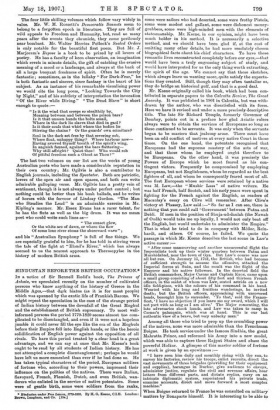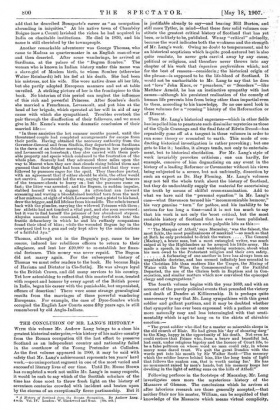HINDUSTAN BEFORE THE BRITISH OCCUPATION.*
IN a notice of Sir Rennell Rodd's book, The Princes of Achaia, we speculated recently on the number of cultivated persons who know anything of the history of Greece in the Middle Ages,—that dmic hiatus (as it is for most people) which was spanned by the exotic life of Frankish Barons. We might repeat the speculation in the case of the strange period of Indian history between the downfall of the Great Moghul and the establishment of British supremacy. To most wellinformed persons the period 1770-1820 seems almost too complicated to be disentangled, and even if it were not a hopeless jumble it could never fill the eye like the era of the Mogbuls before their Empire fell into English hands, or like the heroic solidification of English power against the opposition of all rivals. To have this period treated by a clear head is a great advantage, and we can say at once that Mr. Keene's book ought to be read by all students of Indian history. He has not attempted a complete disentanglement; perhaps he would have left us more enmeshed than ever if he had done so. He has taken typical characters of the period, European soldiers of fortune who, according to their powers, impressed their influence on the polities of the natives. There were Italian, Savoyard, French, Flemish, Dutch, and even British, wanderers who enlisted in the service of native potentates. Some were of gentle birth, some were soldiers from the ranks, some were sailors who bad deserted, some were frothy Pistols, some were modest and gallant, some were dishonest money.
grubbers, some were high-minded men with the elements of statesmanship. Mr. Keene, in our opinion, might have been much bolder in his method. It is necessarily a selective method, and we should have been glad if, at the cost of
omitting many other details, he had more resolutely chosen biographical facts about his chief characters. To have these romantic lives reconstructed completely before our eyes,—that
would have been a truly engrossing subject of study, and would have interpreted for us the only thing worth extracting,
the spirit of the age. We cannot say that these sketches, which always leave us wanting more, quite satisfy the expectations they created. Still, though they may often tantalise us, they do bridge an historical gulf, and that is a good deal.
Mr. Keene originally called his book, which had been contributed in separate papers to the Calcutta Review, The Great
Anarchy. It was published in 1901 in Calcutta, but was with
drawn by the author, who was dissatisfied with its form. Here we have it revised and under a more precisely descriptive title. The late Sir Richard Temple, formerly Governor of
Bombay, points out in a preface how glad Asiatic rulers
always were to obtain the services of Europeans so long as these continued to be servants. It was only when the servants
began to be masters that jealousy arose. There must bare been an odd conflict of motives at every native Court in those times. On the one hand, the potentate recognised that Europeans had the supreme mastery of the arts of war, and that those whom he employed ought therefore to be Europeans. On the other hand, it was precisely the Powers of Europe which he most feared as his con tingent victors. Frequently he compromised by employing Europeans, but not Englishmen, whom he regarded as the best fighters of all, and whom he consequently feared most of alL
The first European whose services were retained by a native was M. Law,—the " Mushir Lass" of native writers. He
was half French, half Scotch, and his early years were spent in
fighting for the French against the English, as readers of Macaulay's essay on Clive will remember. After Olive's victory at Plaasey, Law said :—" So far as I can see, there is
nothing that you could call 'Government' between Patna and Dehli. If men in the position of Shuja-ud-daulah (the Nawab
of Oudh) would take me up loyally, I would not only beat off the English, but would undertake to administer the Empire." That is what he tried to do in company with Max, Rein hardt, and others. Of course, he fai]ed. We quote the passage in which Mr. Keene describes the last scene in Law's active career :— " After some manceuvring and another unsuccessful flight the Imperialists took up their winter quarters between Patna and
Murshidabad, near the town of Gya. But Law's course was now
all but run. On January 15, 1761, the British, who had become of sufficient strength to assume the offensive, attacked the
Imperial forces at Sum, and the result was the flight of the
Emperor and his native followers. In the deserted field the British commanders, Major Canaan and Captain Knox, came upon a small group consisting of about fifty foot and thirteen French officers, in the midst of whom was Law, seated astride on a now idle field-piece, with the colours of his command in his hand.
Wearied with his long and fruitless wanderings, he invited death ; but the British officers, approaching with uncovered heads, besought him to surrender. 'To that,' said the Franco Scot, 'I have no objection if you leave me my sword, which I will not part with as long as I am alive.' The Major consenting, the late adversaries shook hands, and Law was taken to camp in Cameo's palanquin, which was at hand. This is our last authentic view of a brave, but very unlucky man."
Among all those who tried to prop up the crumbling power of the natives, none was more admirable than the Frenchman Boigne. He took service under the famous Sindhia, the great Mahratto. Prince, and reformed his Army into a new model, which was able to capture three Rajput States and abase the powerful Heiken A glimpse of this master soldier of fortune at work is given by an eyewitness "I have seen him daily and monthly rising with the sun, to survey his factories, review his troops, enlist recruits, direct the
vast movements of three brigades (providing for their equipment
and supplies), harangue in Durbar, give audience to envoys, administer justice, regulate the civil and revenue affairs, hear letters from different parts, and dictate replies, carry on an intricate diplomatic system, superintend his private trade, examine accounts, direct and move forward a most complex machine."
When Boigne returned to France he was consulted on military' matters by Bonaparte himself. It is interesting to be able to
add that he described Bonaparte's career as "an usurpation abounding in iniquities." At his native town of Chamb4ry Boigne (now a Count) lavished the riches he had acquired in India on charitable institutions. He died in 1830, and his name is still cherished by the townspeople.
Another remarkable adventurer was George Thomas, who came to Madras as quartermaster in an English man-of-war and then deserted. After some wanderings, he arrived at Sardhana, at the palace of the "Begum Sombre." The woman who is known in Indian history under this name was a slave-girl of Moslem birth, to whom Sombre (otherwise Walter Reinhardt) left his fief at his death. She had been his mistress, not his wife. She wore native dress all her life, but she partly adopted European manners and sat at table unveiled. A striking picture of her is the frontispiece to this book. No historian of this period can neglect the influmma of this rich and powerful Princess. After Sombre's death she married a Frenchman, Levassoult, and put him at the head of her brigade, which operated at her will in aid of any cause with which she sympathised. Troubles overtook the pair through the disaffection of their followers, and we must give in Mr. Keene's words the dramatic conclusion of their married life "In these anxieties the hot summer months passed, until the threatened couple had completed arrangements for escape from their perils. Having obtained the necessary authority from the Governor-General and from Sindhia, they departed from Sardhana in the dawn of all October morning, the Begum in her palanquin and Levassoult on horseback ; they also carried with them portable property and specie which conduced to the frustration of the whole plan. Scarcely had they advanced three miles upon the way to Meerut when they saw dust clouds rising behind them and guessed that their ffight had been discovered and that they were followed by pursuers eager for the spoil. They therefore parted, with an agreement that if either should be slain, the other would not survive. Levassonit led the way, urging the groaning bearers of the treasure-chests to hurry on ; but the pursuers came on fast; the litter was arrested ; and the Beg-um, in sudden impulse, stabbed herself with a dagger. An attendant ran forward screaming and waving a bloodstained kerchief torn from the neck of her mistress, at sight of which Levassoult put a pistol to his head, drew the trigger, and fell lifeless from his saddle. The rebels turned back with the plunder, carrying the widowed Princess with them ; her stiletto had not touched a vital part, and she soon recovered, but it was to find herself the prisoner of her abandoned stepson. Aloysius assumed the command, plunging forthwith into the frantic debauchery in which he and his ruffianly companions found their ideal of bliss ; while the wounded Begum lay in the courtyard tied to a gun and only kept alive by the ministrations of a faithful Aya."
Thomas, although not in the Beguat's pay, came to her rescue, induced her rebellious officers to return to their allegiance, and lent her 220,000 to re-establish her financial fortunes. This money was never repaid. The Begum did not marry again. For the subsequent history of Thomas we must refer readers to the book. He became Raja of Hariaxia and Dictator in Cis-Sutlej. He was always loyal to the British Crown, and did many services to his country. Yet how astonishing to reflect that this masterful man, treated with respect and honour by every agent of the British power in India, began his career with the punishable, but unpunished, offence of desertion ! There were some strange genealogical results from the marriages of these powerful wandering Europeans. For example, the case of Dyce-Sombre which occupied the English Law Courts some fifty years ago, is still remembered by old Anglo-Indians.







































 Previous page
Previous page